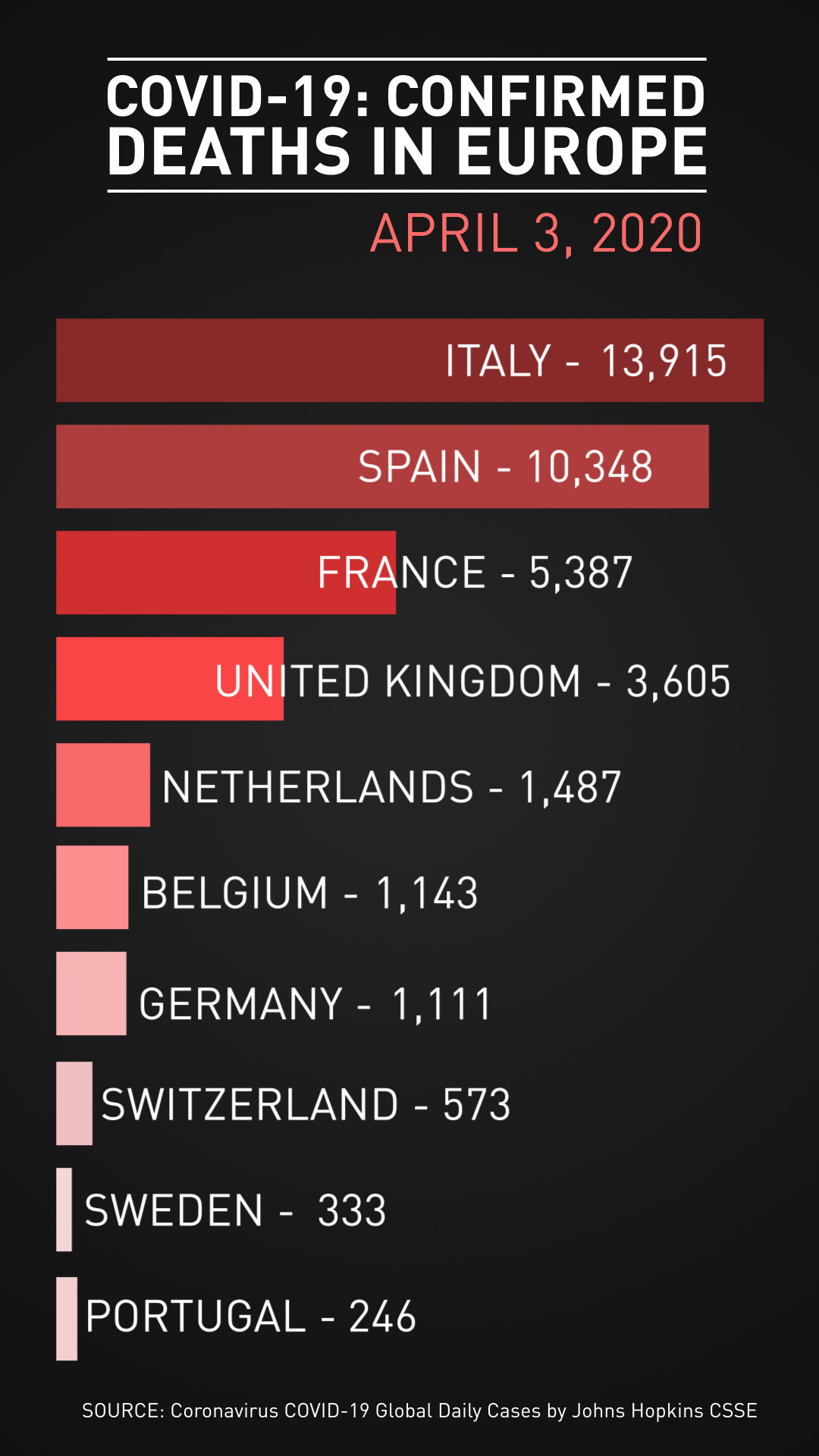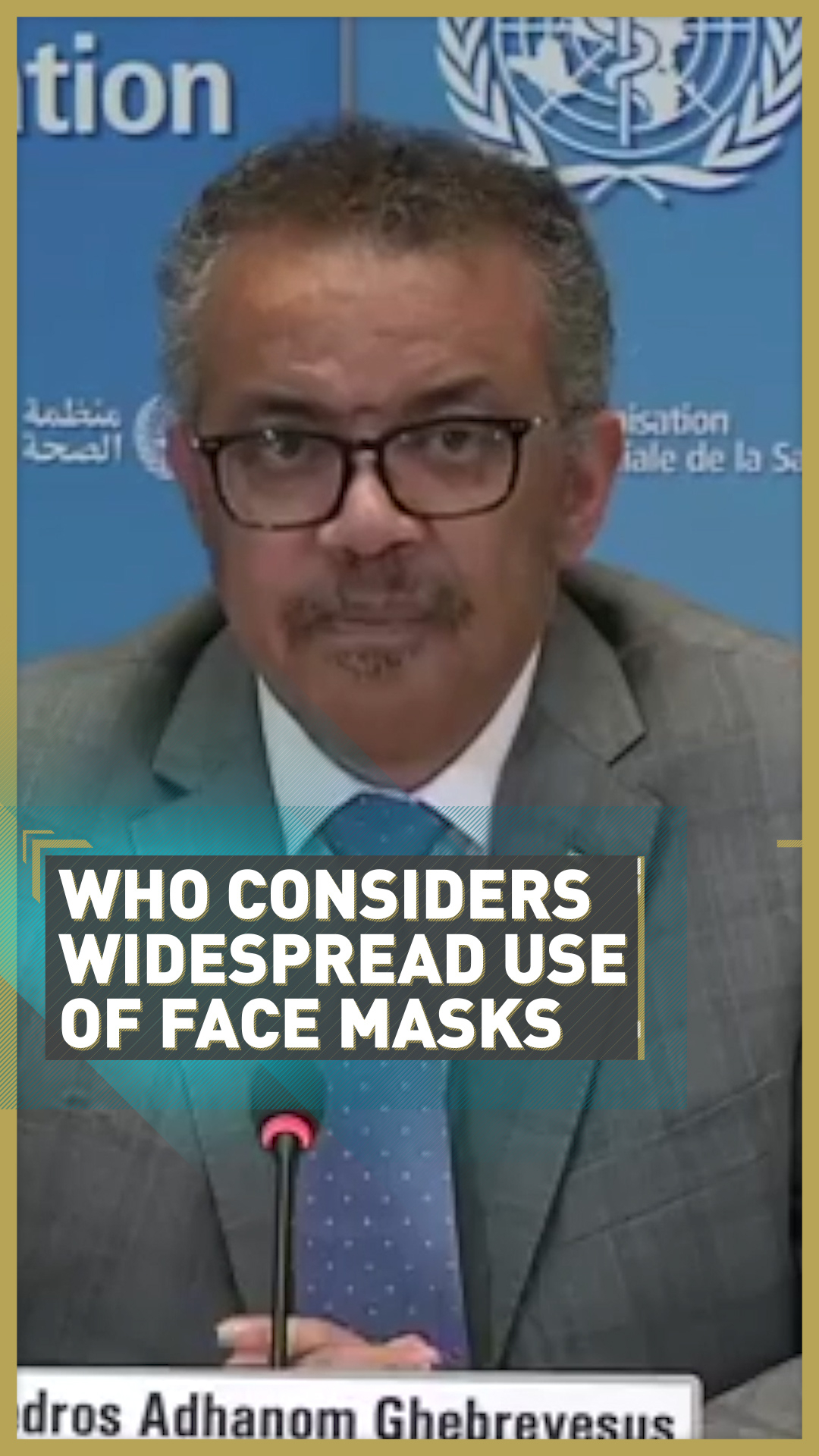TOP HEADLINES
• There are now more than a million confirmed COVID-19 cases globally, with nearly 53,000 deaths and more than 210,000 recoveries
• The U.S. daily total of 1,169 deaths is the highest recorded in any country during the pandemic
• "More and more younger individuals" are becoming critically ill and dying from coronavirus and not all have underlying conditions, says WHO’s Maria van Kerkhove
• Countries that rush to lift quarantine restrictions risk an "even more severe and prolonged" economic downturn and a resurgence in COVID-19 cases says the WHO's director-general Tedros Adhanom Ghebreyesus
• The UK has suffered its deadliest day of the pandemic with 684 deaths, a 23 percent rise to a total of 3,605
• Volunteers have been asked to come forward in the UK to take part in clinical trials on COVID-19 by Health Minister Matt Hancock
• The UK government has denied there is a shortage of beds and said there are 2,029 beds free for critical care
• Spain's daily death toll dropped for the first time in a week, with 932 new fatalities, slightly down on yesterday's 950; the total is now 10,935
• Germany's death toll has topped 1,000, according to its Robert Koch public health institute. Johns Hopkins University calculates Germany has close to 85,000 confirmed cases – more than China
• From tomorrow, Russia is to suspend all international flights – including repatriation missions in and out of the country
• Germany's chancellor Angela Merkel is out of quarantine after repeatedly testing negative – but UK Prime Minister Boris Johnson remains in isolation with a high temperature
• Google is publishing anonymized overviews of public movements, enabling authorities to manage the outbreak
• Hungarian pharmaceutical firm Alkaloida Zrt has requested a domestic distribution license for its drug hydroxychloroquine, saying it can produce enough pills to treat 2.2 million infected people – but the European Commission says there is no evidence yet that the drug works on COVID-19
• The European University Hospital Alliance has called for borders to be kept open for medical supplies, warning that sedative and painkilling drugs for intensive care patients will start to run out in two weeks' time
• Latvia has reported its first coronavirus death. With Slovakia having reported its own first casualty on Tuesday, the only member of the EU 27 not to report a death is Malta
• Via videolink, Prince Charles has opened London's new intensive care hospital, the Nightingale (pictured below); it can house up to 4,000 COVID-19 patients
IN PICTURES: The UK gets a new hospital

Britain's Prince Charles communicates via videolink as he opens the NHS Nightingale Hospital at the ExCel centre in London. /Clarence House/AP
Britain's Prince Charles communicates via videolink as he opens the NHS Nightingale Hospital at the ExCel centre in London. /Clarence House/AP

UK Health Secretary Matt Hancock delivers a speech at the opening of the hospital. /Stefan Rousseau/Pool/AP
UK Health Secretary Matt Hancock delivers a speech at the opening of the hospital. /Stefan Rousseau/Pool/AP

Prince Charles appears on a screen to Matt Hancock at the hospital. /Stefan Rousseau/Pool/AP
Prince Charles appears on a screen to Matt Hancock at the hospital. /Stefan Rousseau/Pool/AP

A ward in the new hospital that was built in just over a week. /UK Ministry of Defence
A ward in the new hospital that was built in just over a week. /UK Ministry of Defence

The hospital is set to start welcoming patients. /AP
The hospital is set to start welcoming patients. /AP

Members of the British Army helped build the facility. /Ministry of Defence
Members of the British Army helped build the facility. /Ministry of Defence
ACROSS EUROPE
By Julia Lyubova in Switzerland
As the number of infections and deaths continues to grow, Switzerland's government says it would be premature to relax restrictive measures that were imposed to limit the spread of the coronavirus.
Daniel Koch, head of the Federal Office of Public Health's communicable diseases division, said the number of new cases was increasing by around 1,000 cases per day. The government is advising the public to keep their distance from one another, stay at home and maintain hygiene.
With warm spring weather forecast over the Easter weekend, the authorities are also urging people not to go on holiday, with campsites closed until further notice in any case. However, the government has begun preparations for an eventual transition away from restrictions and has unveiled a scientific advisory task force.
By Rahul Pathak in Madrid
The grim milestones keep coming for Spain. With another 950 deaths in the 24 hours from Wednesday to Thursday, total fatalities have now gone past 10,000. However, like yesterday, there are signs that the spread of the virus is slowing, with the health minister Salvador Illa saying the curve of new infections was stabilizing.
Spain also announced its worst ever month in terms of the labor market. During March, 900,000 jobs were lost, bringing the total unemployment to 3.5 million people. As trade union leader Unai Sordo put it: "The country is essentially paralyzed by coronavirus."
00:28

By Ira Spitzer in Berlin
Germany's confirmed coronavirus deaths have topped 1,000 for the first time, according to the latest figures from the Robert Koch Institute. Germany has so far had a comparatively low death rate among confirmed cases: even though that has risen, it is still only 1.3 percent, compared with a worldwide average of 5.2 percent.
The German Teachers' Association is concerned about a long school closure due to the coronavirus pandemic. "Homeschooling is definitely not a standard model: you must not keep it up for too long," its president Heinz-Peter Meidinger told the Funke media group. Studies have shown that digital lessons may be 75 percent less effective than face-to-face lessons. German schools are currently closed until at least the middle of April.
The German capital Berlin has published a list of fines for people who violate social distancing regulations. Leaving the house "without a good reason" can cost between $10 and $108. "Good reasons" include shopping for food or exercising – which includes walking.
By Toni Waterman in Brussels
It will be a test of wills this weekend as Belgium's confinement measures face their biggest challenge yet: warm, sunny weather. In a country with 200 rainy days a year, officials worry that a week-long spell of spring weather will drive many out of their homes and into the streets. They are urging people to stay at home and have set up a task force to help clarify confinement measures. Police have complained that there's too much ambiguity in the measures, making them hard to enforce.
Meanwhile, the Belgian government plans to give doctors, nurses, pharmacists and other front-line hospital staff a one-off, tax-free bonus of 1,540 euros ($1,564) for their hard work during the coronavirus outbreak. The "thank you" plan also encourages businesses to give out 1,000 euros ($1,079) bonuses to employees who return to work or have worked throughout the crisis, such as supermarket employees. Another option is to give essential workers an additional two days of vacation.
01:39

FROM OUR GLOBAL COLLEAGUES
From CGTN China: Asymptomatic patients could cause a second wave of COVID-19
From CGTN America: The Heat: Human cost of coronavirus around the world
From CGTN Africa: Rwandan police to strictly enforce lockdown
CGTN Europe has been providing in-depth coverage of the novel coronavirus story as it has unfolded. Here you can read the essential information about the crisis.
Source(s): Reuters